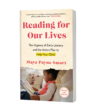Some of my favorite childhood memories were spent close to nature. Whether it was a visit to the local picnic area, being on a family camping trip, or reading a book at the base of a tree, being outdoors surrounded by growing plants was restorative and stimulating. When I became a parent myself, I saw the same benefits for my children as they grew—they were more engaged and enthusiastic when learning took place in an outdoor setting.
Spending time outdoors in natural green spaces provides major benefits for raising readers, and being in nature may even make kids smarter. Researchers (and parents) have observed a plethora of mental, physical, and emotional benefits to getting children outside and active. According to the Journal of Pediatric Nursing, exposure to green spaces promotes memory, self-discipline, and attention. It also reduces stress, encourages positive social growth, and improves behavior.
Being in Nature Can Help Kids Learn
A study in Barcelona followed just over 2,500 primary-school children for a year to better understand the effects of green space on their cognitive development. The researchers found that exposure to such spaces correlated with an improvement in the kids’ working memory and a significant boost in attentiveness. A related study even suggested that regular exposure to such spaces during childhood was associated with increased brain size.
Another study, this time by a group of medical professionals in Rome, showed improvement in kids’ attention levels when they spent time in green spaces, and a positive association with their verbal IQ as well.
And researchers following preschoolers in Norway found that “high exposure to outdoor environments might be a cheap, accessible and environmentally friendly way of supporting and enhancing children’s self-regulatory capacities and cognitive development.” Those researchers even suggested that outdoor exposure could be used to “treat” children with attention disorders: “For some children, high doses of nature may be an effective alternative to medication,” they speculated.
Green Spaces May Reduce Stress & Improve Mental Health
What’s more, scientists in the UK were able to link reduced stress levels to green spaces by measuring levels of stress hormones in participants’ saliva. Researchers saw an increase in the hormone cortisol when subjects were deprived of natural environments.
Similarly, another study found that children between two and five years old who lived in areas with more green spaces around had fewer symptoms of anxiety and depression.
So, if you find teaching reading to your child a stressful endeavor, why not take the literacy learning outside? Both of you may enjoy a breath of fresh air.
How to Find Natural Areas in Urban Environments
While I was fortunate to grow up in a time and place that offered abundant opportunities to explore nature, in many areas those opportunities are shrinking. Many urban areas were built without regard for nature, and it may be difficult to find a patch of green in some areas. This is particularly true of disadvantaged urban areas.
Fortunately, cities are starting to see the value in prioritizing natural areas. Small areas of green are popping up all over the place. Communal gardens and green spaces have been created by reclaiming derelict or vacant properties, like Platt Farm Open Space in Denver, once a dumping ground for industrial waste.
In addition, many public libraries, such as those in Los Angeles, Denver, Orlando, and New York, offer a limited number of free cultural tickets to library cardholders. Most of these programs have a few nature-centered destinations, such as botanical gardens and zoos, among the museum and theater options. In most cases, parents can take advantage of these free programs via their library’s website and book their free passes online.
Cities frequently have nature and discovery centers to visit, as well. Nature centers often offer educational walks, maintained trails, habitat restoration, and sometimes even wildlife rehabilitation services. Those who want to get more involved may be able to volunteer, helping with tasks such as clearing invasive weeds, planting trees, and cleaning up trash.
How to Help Your Child Learn In Nature
The research suggests that letting your child play and explore in outdoor spaces is beneficial for their cognitive development all on its own. Adding in fun activities that are specifically designed to fuel their development of reading skills will make the time outdoors even more constructive.
You can name the plants and animals you encounter, weaving in spelling lessons when you encounter a B-U-G on a leaf or a C-A-T in a tree. Vigorous activities like a rousing scavenger hunt or a game of alphabet hopscotch will help your active preschoolers get their excess energy out so they’ll behave better at home. After allowing them to expend their excess energy outdoors, you can sit down with your kids and read a book about the outdoors.
Check out these curated lists of recommended picture books about the outdoors and picture books about gardening for a great start!
Like this post? Share it!



